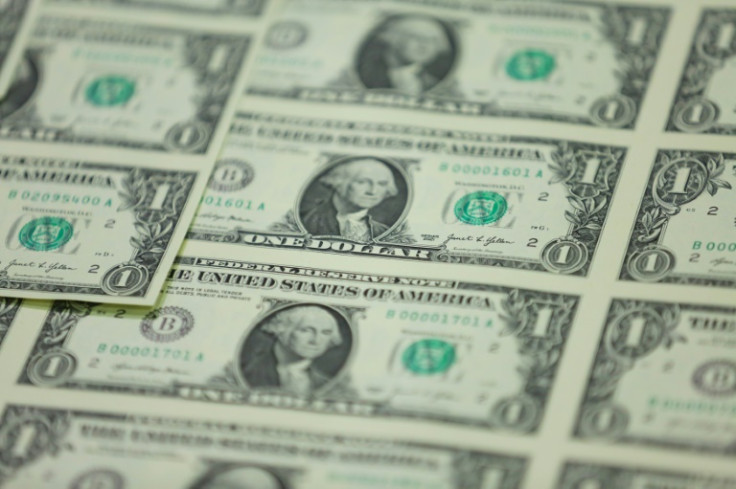
Tokyo led a collapse across Asian and European equities Monday, after weak US jobs data fanned fears of a recession in the world's top economy and boosted bets on several Federal Reserve interest rate cuts.
Trading boards showed a sea of red following another hefty day of losses on Wall Street, where heavyweight tech firms including Amazon and Microsoft took the brunt over worries an AI-fuelled rally this year may have been overdone.
A much-anticipated report Friday showed the US economy added just 114,000 jobs last month, well down from June and far fewer than expected, while the jobless rate rose to the highest level since October 2021.
The news came a day after lacklustre factory data that stoked concerns that Fed officials may have held borrowing costs at more than two-decade highs too long.
That has led to speculation the economy could be in for a hard landing and tip into recession.
Some analysts pointed to the "Sahm rule", which says an economy is in the early stages of recession if the three-month moving average of unemployment is 0.5 percentage points above its low over the previous 12 months. That was triggered by Friday's data.
The losses in New York were followed in Asia, with Tokyo's Nikkei tanking more than 12 percent in its worst day since the Fukushima crisis in 2011. It also suffered its biggest points loss, shedding 4,451.28.
Seoul and Taipei plunged more than eight percent each, while Singapore gave up nearly five percent and Sydney more than three percent.
Futures trading was temporarily suspended on the Nikkei and Topix indexes, on the Osaka Exchange and in Seoul in a bid to ease volatility.
Hong Kong and Shanghai lost more than one percent, with traders brushing off a set of directives released by China aimed at boosting household consumption in the world's number two economy.
There were also big losses in Mumbai, Bangkok, Manila, Jakarta and Wellington.
London, Frankfurt and Paris each fell more than two percent.
The biggest losers were tech firms, with chip titan TSMC losing nearly 10 percent in Taipei, while Seoul-listed Samsung and SK Hynix were each down more than 11 percent. Tokyo Electron nosedived 18.48 percent in Japan.
But the pain was not reserved only for the tech sector, with Toyota shedding 13.65 percent and HSBC off more than five percent.
Bitcoin dived more than 10 percent as cryptocurrencies were also hammered.
Markets are "still reeling from last Friday's seismic shifts in the global financial landscape", said Stephen Innes in his Dark Side Of The Boom newsletter.
"The trigger? A US employment report that missed the mark so badly it didn't just drop jaws -- it dropped stocks and bond yields while sending volatility and rate cut expectations through the roof."
He pointed out that "the mood was already souring in Asia" following a disappointing batch of earnings from tech titans such as Tesla and Alphabet as well as a rate hike by the Bank of Japan and more weak Chinese economic data.
"Mix these, and you have the perfect market meltdown recipe," Innes said.
The selling was also making officials in Tokyo sit up because the losses Monday followed a 5.8 percent drop Friday.
Japan's finance minister Shunichi Suzuki told reporters the government will "monitor developments in domestic and international financial markets with a high sense of urgency".
It is best if the value of the yen changes "in a stable manner" and the government will also "continue to monitor movements in the exchange rate", he said.
The yen broke through 143 per dollar for the first time since January as the jobs report ramped up expectations the Fed will slash rates.
The US central bank had signalled after its latest meeting on Wednesday that slowing inflation and a softening labour market meant it could cut next month, with traders predicting two or three 25-basis-point reductions before January.
Now there is speculation it will lower rates a full percentage point in that time.
Taylor Nugent at National Australia Bank said: "The Fed doesn't meet again until September 18. There is one more payrolls report and two (consumer price indexes) before then.
"It's hard to imagine they could stop the Fed cutting in September, with interest instead on whether they support a 50-basis-point move and how rapid cuts will be going forward."
The yen -- which just last month hit a nearly four-decade low close to 162 to the dollar -- was also boosted by the Bank of Japan's decision last week to hike interest rates for only the second time in 17 years and its suggestion more could be on the way.
Nozomi Moriya at UBS forecast the yen to end the year around 145 to the dollar and drop to around 130 in 2025.
Tokyo - Nikkei 225: DOWN 12.4 percent at 31,458.42 (close)
Hong Kong - Hang Seng Index: DOWN 1.5 percent at 16,698.36 (close)
Shanghai - Composite: DOWN 1.5 percent at 2,860.70 (close)
London - FTSE 100: DOWN 2.1 percent at 8,002.13
Dollar/yen: DOWN at 143.40 yen from 146.52 yen on Friday
Euro/dollar: UP at $1.0930 from $1.0912
Pound/dollar: DOWN at $1.2800 from $1.2802
Euro/pound: DOWN at 85.20 pence from 85.22 pence
West Texas Intermediate: DOWN 0.5 percent at $73.15 per barrel
Brent North Sea Crude: DOWN 0.3 percent at $75.61 per barrel
New York - Dow: DOWN 1.5 percent at 39,737.26 (close)







